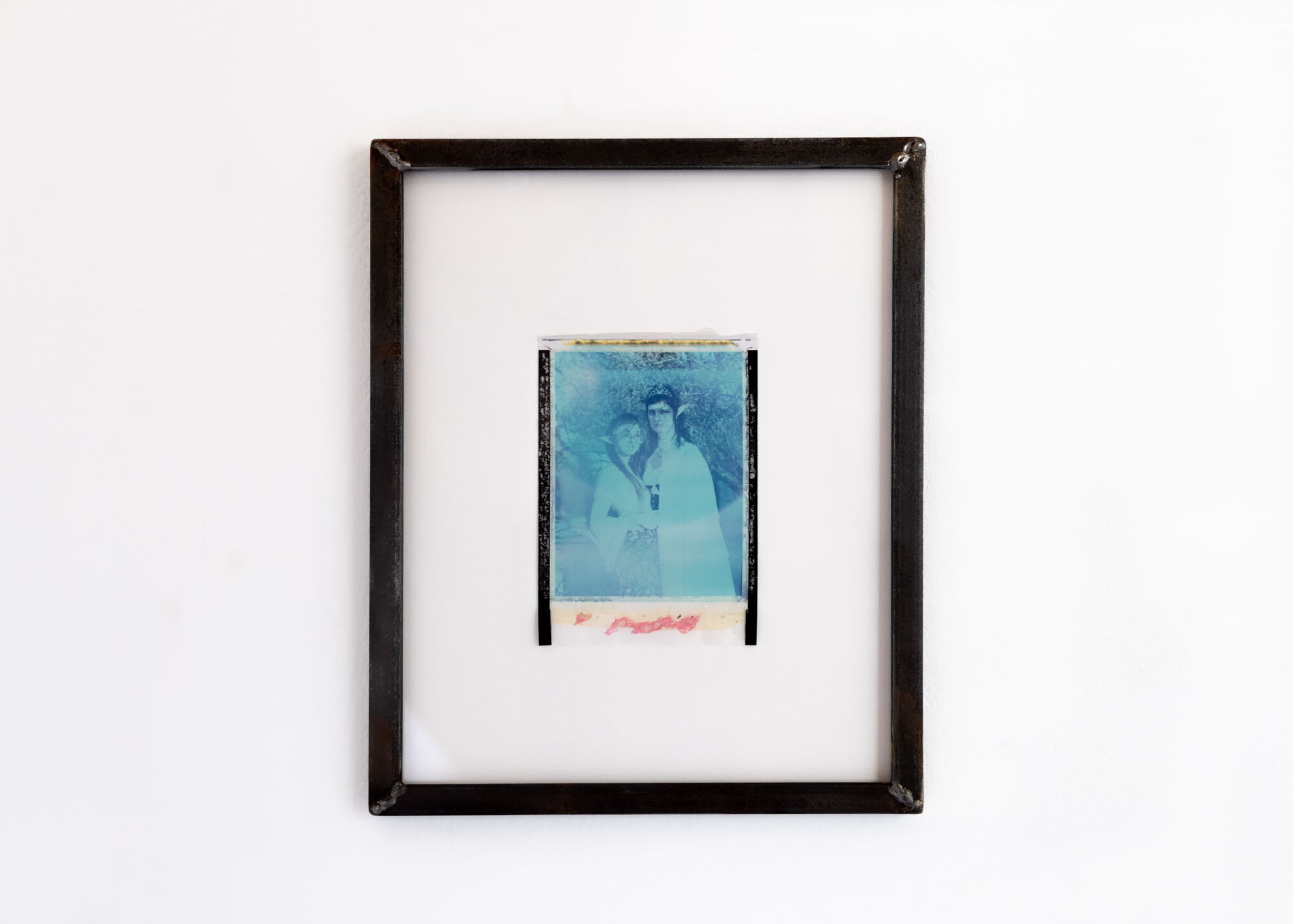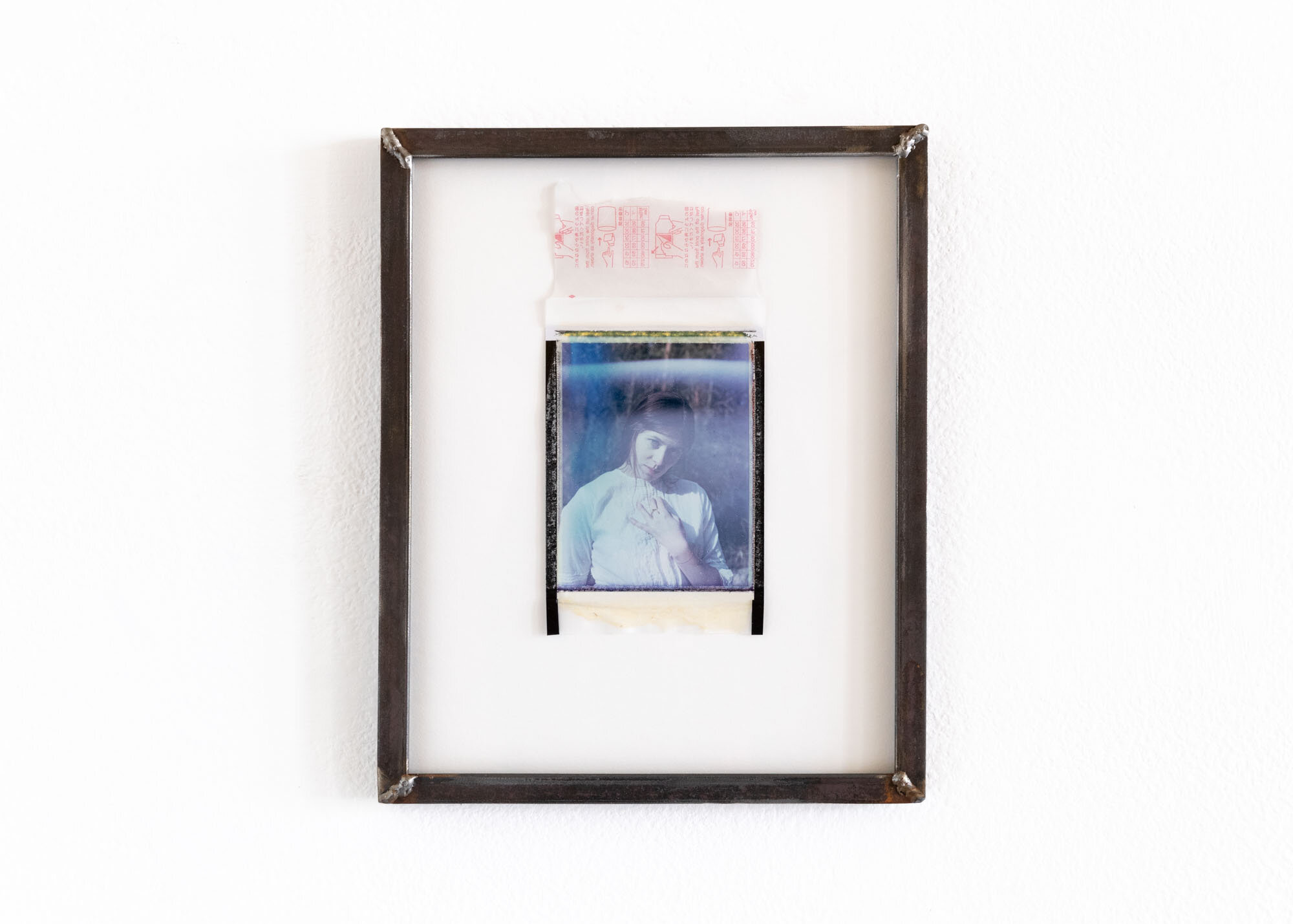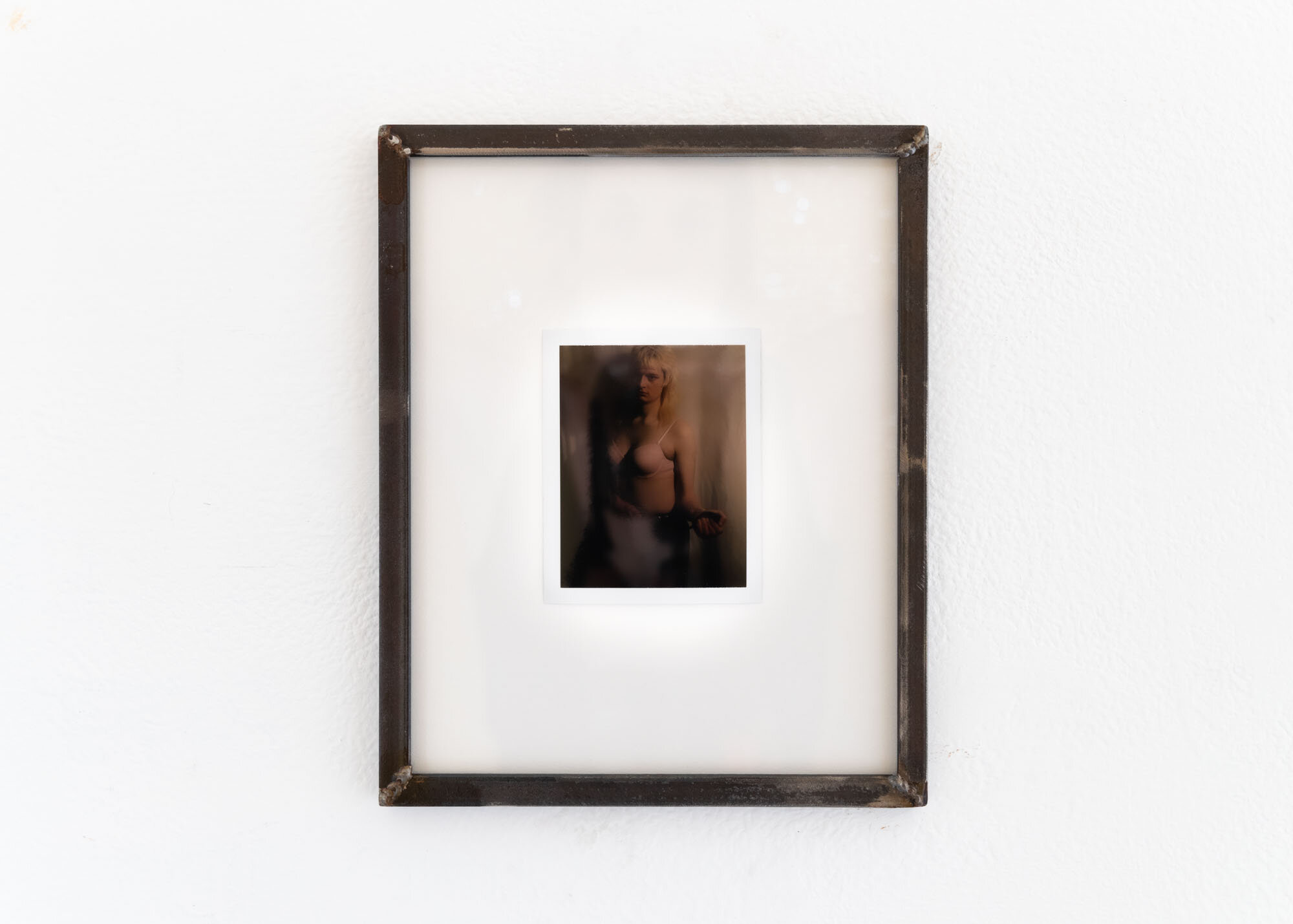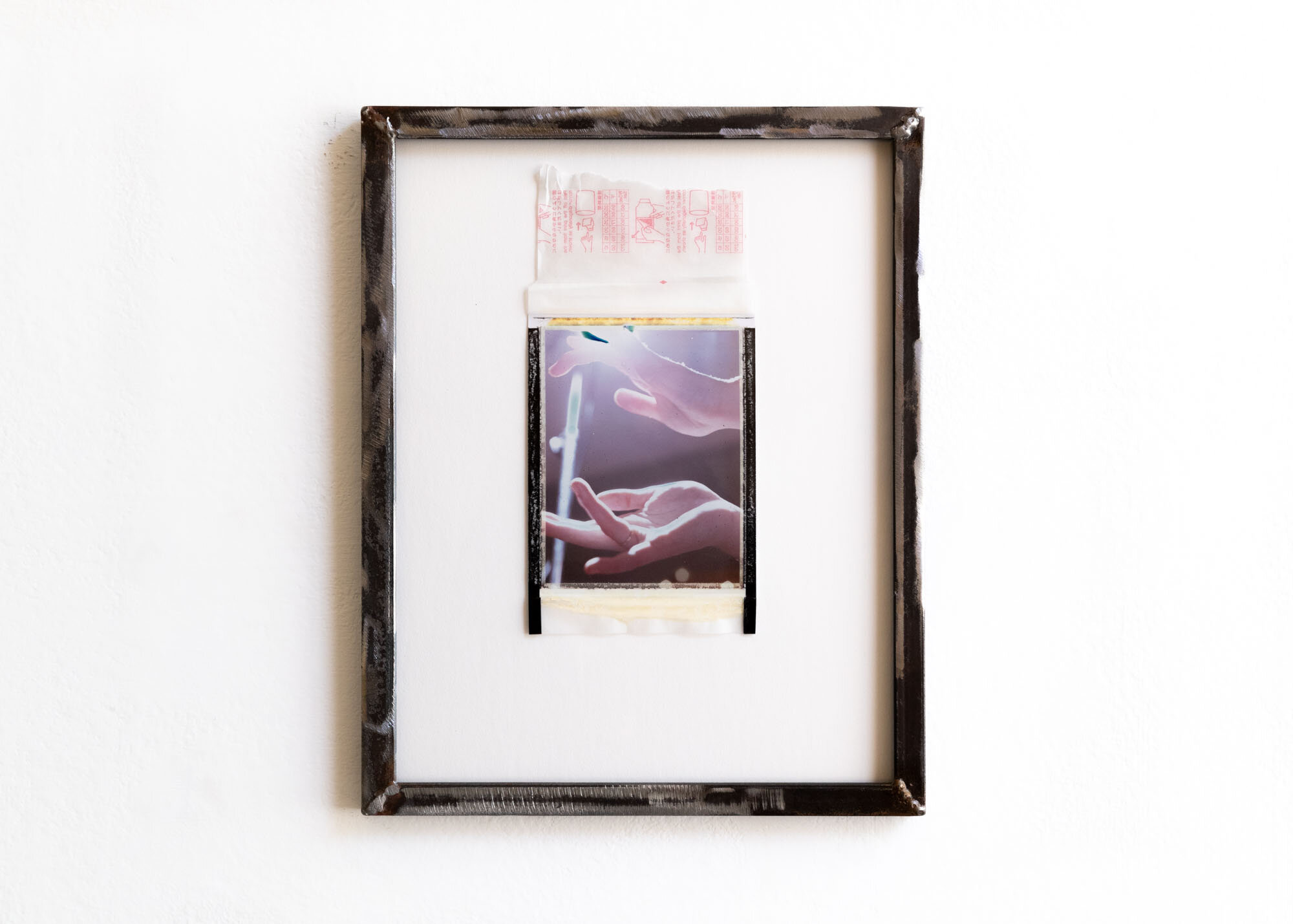Q&A: JUNE T. SANDERS
By Kelsey Sucena | July 29, 2021
June T Sanders is an artist, writer, educator, and curator from south central Washington state. She lives there still. She is currently an assistant professor with the digital technology & culture program at Washington State University.
Kelsey Sucena (they/them) is a trans*/nonbinary photographer, writer, and park ranger currently residing on Long Island. Their work rests at the intersection of photography and text, often within the bodies of performative slideshows and photo-text-books. It is centered broadly upon the United States as a site for anti-capitalist, queer, and critical reflection. Kelsey is a recent MFA graduate from Image Text Ithaca (2020), Managing Editor of The Photocaptionist, and a freelance writer with contributions to Float Photo Magazine, Rocket Science, and 10x10 Photobooks.
"June Sander's Easy World is a necessary and mystical archiving of memory, imbued with loss, longing, hope, desire, and despair. While Sander's chronicles lives in a particular time and place, her images build on universal themes and, ultimately, reflect on a world yet to be.”
- Zackary Drucker, 5/1/21
Kelsey Sucena: June, I want to start by saying that it brings me so much joy to have this opportunity to chat with you. I don’t remember when I first encountered your work, but I do remember this immense sense of possibility which I felt in viewing it. At the time I was still very closeted. The art that I was making, and the art that I was viewing buoyed me through that period in my life. I remember seeing your images, so delicate, tender, and yet boldly imprecise, and thinking that a better world was still possible. Looking at the images of Easy World, I still feel that possibility.
Before we jump in I’d like to ask you how you’ve been doing. I always love to see you sharing images from your rides across the Washington countryside and am curious to know more. How has life been where you are? How have you been spending your days as of late?
June T. Sanders: Mmm. Well, I just got done with my first year as a full time Assistant Professor - which has been both exhilarating and exhausting - and involved a lot of student support and advocacy and rethinking how I teach. Lots of mind work. And I usually take the summers to reorient myself with my hands and my body // I've been doing landscaping work for a woman in Idaho. I do it most summers. I tend to her apple trees and weed and mow and she feeds me iced tea and graham crackers // In the evenings I go on long runs through the cemetery and the pastures and back // On Sundays we play gay baseball behind the highschool // those rides across the washington countryside you mention are usually me taking the motorcycle down through the wheat fields to the snake river canyon where you can cliff jump and swim. Sounds idyllic huh? It is. It's lonely too. And hard sometimes. But I'm happy to be where I am right now and to have my community here and to be engaging with so many visceral activities. I joked about this with someone recently - but if you would have told me 10 years ago that at this age I would be a rural trans art professor sitting just 100 miles from the town I grew up in - well, I'd have a hell of a time believing you.
KS: Oh, lol, I know what you mean. It’s pretty miraculous where our desires lead us. I want to start there with this work. Within your photography, you’re careful to use obsolete and expired processes in a way that runs against the imperative of photographers to reproduce the world as we think it is. As you describe it, this flawed process gestures not just toward the subject, but toward desire. I want to know more about your thoughts on desire, about how it works within your work to “transfigure”, transform and transmute the world.
JS: Kelsey // thank you // what an emboldening thing to hear. Sometimes hearing that sense of possibility reflected back to me is all I need to hear. And I love that phrase. Boldly imprecise.
-
I try to work with desire on a conceptual and emotional and even a gutteral level. The desire towards another, the desire for a new body or a new world, desire as refusal, a desire to be free of oppressive systems, a desire to see and to be seen and to at times be unsubscribed. If my aesthetics can take weight and scrutiny off the body involved and instead shift attention to those desires then I feel like I've done alright.
I knew early on that I was never going to be a technical or proficient photographer. And I don't wish to be one. I've found that I'm not interested in faithful and clean representations of the world, or images that strive to be. It's the same view I have towards working on vehicles. If my car starts by using a tire wrench to override the solenoid — that's ultimately more interesting than my ability to replace the starter. There's something about flaws and mistakes and leaks and antiquation that helps me see past the image and into the intention or collaboration or essence behind it. And to — like you asked — transfigure or transform. For me it creates that sense of possibility. I did get flak for this in school. And looking back — I do think that critique came from the idea that the craft of photography is the production of the image (the editing, exposing, etc) and not the gesturing. But that's where the work is. The gesture, the performance, the looking. The moments we spend together. A dear friend recently wrote about my work and quoted Lucille Cliffton saying “there was all around not the / shapes of things / but oh, at last, the things themselves.” I think that's it, really.
KS: June, thank you for sharing that lovely bit of text by Abigail. It speaks so tenderly to the gestural landscape of your process. That is, to the sense in which desire directs us. I am often surprised by how much photographs can reveal our desires. I was once so enthralled by these photographs I took of a woman I met out in Montauk in the middle of the winter that a professor asked me if I wanted to be with her romantically, and I thought to myself no, I just want to BE her. At the time I assumed it was her solemn isolation I desired, but time has made me the fool.
So tell me, what is it that you desire? Who are these people and why do you think you find yourself gesturing toward them?
JS: What do I desire? Oh, Kelsey, I don't know if I can name that for you. I think if I knew, concretely, I wouldn't make the way I do. I don't want to disregard that question because I know it's an honest one - but I seem to get it alot. People want to know who these people are - their gender, their names, my relationship to them. And the more I make images the more I've leaned into privacy and ambiguity. It ranges from people I'm intimate with to people I hardly know - and I think I'm invested in seeing if I can sort of hide that gap in relation. Do you know what I mean? Maybe if I obscure it I can engage in - pardon the reference - world building.
But, I gesture toward people who both hold themselves a certain way and are open to the kind of intensity and performance that is needed for this type of image making. It's long, it's drawn out, it's clumsy. It's a performance. I think something we don't talk about enough when it comes to portraiture is sort of this skill of reading people's level of engagement and what kind of photos they are invested in producing of themselves. Very talented photographers know intuitively, and through attuned looking, what kind of person is going to make for a good "subject". But the thing I try to instill in my students is the 2nd step of knowing what kind of person is also going to engage with you in that image. It needs to be an exchange, at least for me. Not just a give and take. In short, I gesture towards people who want to see themselves in a new way - and are open to letting the product of that exchange help others who might need that reflection too.
KS: I don’t at all feel as though you disregarded the question. In fact, you seem to have given it a great deal of thought. I suppose that if our desires were easy to express in words then we wouldn’t look to photographs to help us interpret, express, or possess them. That’s all to say that I too am less interested in the specifics of your subject’s names, genders, or your relationship to them, so much as I am interested in the question of what it means to relate photographically, intimately, and humanely.
At the same time, I understand that hesitancy you detailed. I recently read you saying something about this unfortunate dynamic that arises when audiences, and especially cis audiences, play the gender ‘guessing game’ with your subjects. At that moment my heart sort of dropped. It felt cruel to imagine. Cruel in a way that I feel photographers ought to wrestle with often, especially when our subjects are other people.
To return for a moment to your earlier reference, your “world-building”, I’d like to know where this project arose from, how it got its title, and what exactly this Easy World is.
JS: I do wrestle with that often. I wrestle with the responsibility I have towards others and the people I make photographs with.. It's hard to create images of what we imagine or want to see in the world without falling for assimilation or reduction or the trappings of visibility.
This project came from my obsession with creating tangible photographs. I've been using a lot of direct positive photo paper - loading it into my graflex and developing it and giving the print away to the person in the photo. And when someone I knew sent me some fuji peel apart film he had in his freezer I shifted all my attention to that. This show came out of about 2 years of making images with that film. In such a slow and precious way.
//
I feel almost embarrassed to admit this, because so many photographers take lines from songs, but it did come from an old country song I heard once. Out here we have an AM radio station - Classic Palouse Country - and this unknown 80s song came on while I was volunteering at the community center. I danced and put clothes away and watched the snow come down on main st. Things really did feel easy in that moment. And I was enamoured by the idea once I started thinking about temporality and contradiction... Moments of creation do feel as easy as they do serious and intimate... And the end product or representation or things i'm speaking about in the images are anything but. Easy World tries to hold those dualities I suppose...
KS: Oh, that’s brilliant! Utterly so. Photographs like yours require so much time and attention to create. Craft. Trial and error. Money. Material. Thought. Even frustration. And yet they are viewed in an instant, even as they are viewed to be products of an instant. They’re easy to look at and to appreciate, but they are birthed, as we are birthed, as the culmination of so much more.
Revisiting Abigail’s text, which is really such a tender and rare glimpse into that space on the other side of our lenses, I am stricken by this odd duality. Specifically, I’m thinking about the way she frames the process of her being photographed as both contrived/performative, and entirely authentic. It had me thinking about performative gender, and the performance of identity more broadly. Is this something you think about often within your work?
JS: Of course I do. It's our reality right? Gender 101 teaches us that gender is a performance. And we know that gets a bit more complex when we involve a camera or documentation. Of course. And I do think about those things. It's always been important to me that I give people the space to perform, or create that space with them.
But lately I've thought about it in relation to archives and visibility... What I should say is that it's actually not my intent to get the general public to think about gender. My intent is to create an archive - a complicated one that maybe flies under the radar of general consumption. One that impacts those who need the images, know the cues, or lust for these materializations for their own growth or manifestations of themselves or their inner world. In this exhibition I was actually very careful not to use the words 'gender' or 'queer' in any of the writing. And it wasnt to erase that reality or create something anonymized — it was to see what was still there. To see what can't be monitored and extracted. The messiness, the contrivances, the unreliably authentic and performative process, I hope, conspire to create something opaque, abundant, and slippery.
KS: Lately, I've been feeling a bit off about the label of "queerness" when it is applied to art. I'm thinking in particular about this demand that is made of queer artists to make queerness explicit within our work. To make work that is didactic, conceptual, theoretical, and theatrical if we are to claim that mantel. I suspect this has a lot to do with market imperatives. With the need to make work as legible as possible for an audience of consumers who maybe wouldn’t “get it” otherwise. We’re compelled to point to queerness directly, rather than softly gesture in its direction.
In light of that, I find your work, and the way you think about it, to be refreshing. I think you are successful at what you set out to do. To make it messy. Opaque. Slippery. To avoid those extractive impulses of our economy while making work that is also so full of joy and tenderness.
I’d like to move away from queerness/gender for a moment, if only because I know your coast been locked within the midst of a historic heatwave. As I type this now I see that it is 93 degrees in Spokane where your work is showing, and I know that it’s been hotter in many parts of Washington over the last few weeks. To that end, I’d like to just ask you if you’re ok? It feels a bit like the world is ending most days and I wonder where you find your mind drifting in the face of everything?
JS: Right. It got to about 106 degrees last week in my town. Around 112 in Portland, I believe. It's' not too much worse than the summers where I'm from. But it is impactful.
I've already been leaning into slowness and sincerity and care this year - and this feels like another iteration that forces us into a new level of intention. I think about the little, repetitive tasks like opening and closing windows at certain times, bringing around a spray bottle so I can mist people with rosewater, huddling at the cooling center down the street - and how much it puts me back into my body. How much we have to pay attention to our needs.
One redeeming thing about extreme weather, sometimes, is the sort of universality of it. Everyone is going through the same thing. And there's a level of altruism, resourcefulness, and generosity that can arise from these disruptions. Rebecca Solnit writes about this alot, and articulates it much better than I can. But to answer your question - I guess my mind has been drifting into my body. And that feels alright.









